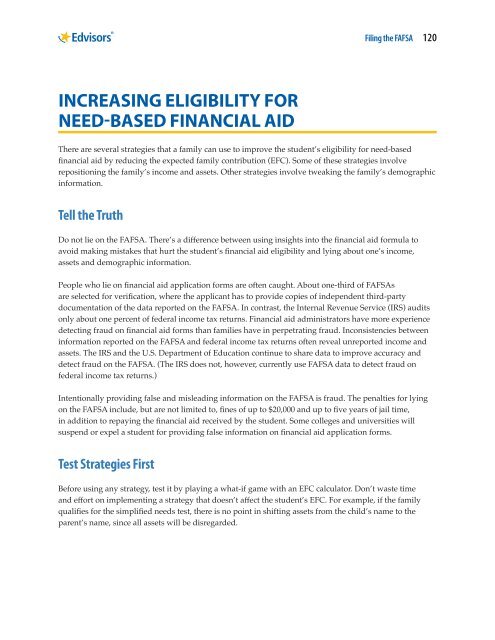filing-the-fafsa-2015-2016-edition
filing-the-fafsa-2015-2016-edition
filing-the-fafsa-2015-2016-edition
You also want an ePaper? Increase the reach of your titles
YUMPU automatically turns print PDFs into web optimized ePapers that Google loves.
Filing <strong>the</strong> FAFSA 120<br />
INCREASING ELIGIBILITY FOR<br />
NEED-BASED FINANCIAL AID<br />
There are several strategies that a family can use to improve <strong>the</strong> student’s eligibility for need-based<br />
financial aid by reducing <strong>the</strong> expected family contribution (EFC). Some of <strong>the</strong>se strategies involve<br />
repositioning <strong>the</strong> family’s income and assets. O<strong>the</strong>r strategies involve tweaking <strong>the</strong> family’s demographic<br />
information.<br />
Tell <strong>the</strong> Truth<br />
Do not lie on <strong>the</strong> FAFSA. There’s a difference between using insights into <strong>the</strong> financial aid formula to<br />
avoid making mistakes that hurt <strong>the</strong> student’s financial aid eligibility and lying about one’s income,<br />
assets and demographic information.<br />
People who lie on financial aid application forms are often caught. About one-third of FAFSAs<br />
are selected for verification, where <strong>the</strong> applicant has to provide copies of independent third-party<br />
documentation of <strong>the</strong> data reported on <strong>the</strong> FAFSA. In contrast, <strong>the</strong> Internal Revenue Service (IRS) audits<br />
only about one percent of federal income tax returns. Financial aid administrators have more experience<br />
detecting fraud on financial aid forms than families have in perpetrating fraud. Inconsistencies between<br />
information reported on <strong>the</strong> FAFSA and federal income tax returns often reveal unreported income and<br />
assets. The IRS and <strong>the</strong> U.S. Department of Education continue to share data to improve accuracy and<br />
detect fraud on <strong>the</strong> FAFSA. (The IRS does not, however, currently use FAFSA data to detect fraud on<br />
federal income tax returns.)<br />
Intentionally providing false and misleading information on <strong>the</strong> FAFSA is fraud. The penalties for lying<br />
on <strong>the</strong> FAFSA include, but are not limited to, fines of up to $20,000 and up to five years of jail time,<br />
in addition to repaying <strong>the</strong> financial aid received by <strong>the</strong> student. Some colleges and universities will<br />
suspend or expel a student for providing false information on financial aid application forms.<br />
Test Strategies First<br />
Before using any strategy, test it by playing a what-if game with an EFC calculator. Don’t waste time<br />
and effort on implementing a strategy that doesn’t affect <strong>the</strong> student’s EFC. For example, if <strong>the</strong> family<br />
qualifies for <strong>the</strong> simplified needs test, <strong>the</strong>re is no point in shifting assets from <strong>the</strong> child’s name to <strong>the</strong><br />
parent’s name, since all assets will be disregarded.


